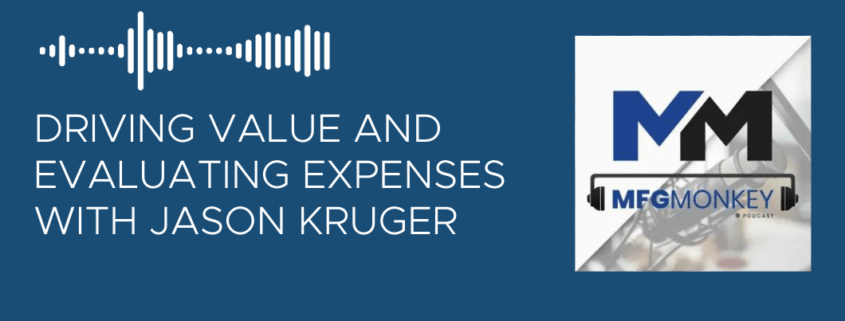Driving Value and Evaluating Expenses with Jason Kruger
Jason Kruger, President & Founder of Signature Analytics, joins the MFG Monkey podcast to discuss key aspects of accounting in business. They cover preparing for economic downturns, nonprofit audits, accurate financial reporting, and optimizing profitability.
Or, read on to discover insights on evaluating expenses, improving financial forecasts, building trust with banks, addressing nonprofit challenges, and leveraging advanced accounting for precise reporting and decision-making.
Weatherproofing Your Business for a Possible Recession: Possible Challenges and Essential Strategies
Weatherproofing your business for a possible recession involves proactive strategies to mitigate economic downturns and ensure resilience.
Learning from Past Challenges
Looking back at previous recessions and the impact of events like COVID-19, many businesses struggled profoundly due to insufficient preparation. Despite these hard-earned lessons, proactive measures were often overlooked. It’s vital to understand the significance of readiness and not wait for the next crisis to act.
Acknowledging Economic Uncertainty
In today’s economic landscape, the specter of another recession is a real concern. While we can’t predict the exact timing, economic cycles show that being prepared is crucial. Business owners need to anticipate and gear up for potential challenges that may lie ahead.
Strategies for Building Business Resilience
Financial Stability: Building cash reserves and reducing debt can provide a financial buffer during lean times. This approach allows businesses to weather reduced sales or unexpected expenses without compromising operations.
Operational Efficiency: Streamlining operations and reducing unnecessary expenses can optimize resources and improve overall efficiency. Businesses should identify areas for cost savings without sacrificing quality or customer service.
Diversification of Revenue Streams:Relying on a single revenue source exposes businesses to higher risks during economic fluctuations. Diversifying product offerings or target markets can stabilize income streams and reduce dependency on volatile sectors.
Customer Retention and Acquisition: Maintaining strong relationships with existing customers through exceptional service and value-added initiatives can enhance loyalty. Simultaneously, strategies for acquiring new customers should be in place to sustain growth despite economic challenges.
Strategic Investments: During downturns, strategic investments in technology, marketing, or employee training can position businesses for long-term growth. These investments should align with the company’s goals and market opportunities.
Scenario Planning: Developing contingency plans and conducting scenario analyses can prepare businesses to respond swiftly to changing economic conditions. By anticipating potential challenges and outlining responsive actions, businesses can navigate uncertainties with greater agility.
Monitoring Economic Indicators: Regularly monitoring economic indicators and market trends enables businesses to stay informed and adjust strategies accordingly. This proactive approach helps in making informed decisions and seizing opportunities amidst economic volatility.
By implementing these strategies, businesses can proactively weatherproof themselves against potential recessions and emerge stronger in challenging economic climates.
Choosing the Right Accounting Software
Choosing the right accounting software for your business is crucial for efficient financial management. Here are key considerations to guide your decision:
Business Needs Assessment: Assess your business requirements, including the size of your operations, industry-specific needs, and growth projections.
Features and Functionality: Evaluate software features such as invoicing, payroll management, inventory tracking, and financial reporting. Ensure the software aligns with your specific accounting needs.
Scalability: Choose software that can scale with your business as it grows. Consider future expansion plans and whether the software can accommodate increased transactions and users.
Integration Capabilities: Ensure the software integrates smoothly with other tools and systems your business uses, such as CRM software or e-commerce platforms.
User Interface and Ease of Use: Opt for software that is intuitive and user-friendly. Training requirements for your team should be minimal to ensure efficient adoption.
Security and Compliance: Prioritize software that offers robust security features to protect sensitive financial data. Verify compliance with relevant regulations such as GDPR or HIPAA, if applicable.
Cost Considerations: Compare pricing plans and subscription models. Factor in initial setup costs, ongoing maintenance fees, and any additional charges for extra features or user licenses.
Customer Support: Assess the quality and availability of customer support options provided by the software vendor. Prompt and reliable support can be crucial during software implementation and for ongoing assistance.
Choosing the right accounting software involves careful consideration of these factors to ensure it meets your business needs effectively and contributes to streamlined financial management.
Understanding Profitability and Cash Flow
Understanding profitability and cash flow are fundamental to financial management and business success.
Profitability Analysis: Evaluate the profitability of each business activity or project to understand which aspects are contributing positively to your bottom line. This analysis helps in identifying areas where efficiency can be improved and costs can be minimized.
Cash Flow Management: Maintain a clear understanding of your cash flow dynamics. This involves monitoring cash inflows and outflows to ensure that there’s enough liquidity to cover expenses and investments, especially during periods of growth or economic fluctuations.
Strategic Decision-Making: Use profitability and cash flow insights to make informed decisions. Whether it’s investing in new initiatives, scaling operations, or managing expenses, data-driven decision-making ensures that resources are allocated optimally to support sustainable growth.
Forecasting and Planning: Develop robust forecasting models to project future profitability and cash flow scenarios. This proactive approach allows businesses to anticipate financial needs, mitigate risks, and capitalize on opportunities in a timely manner.
Continuous Monitoring: Regularly review profitability metrics and cash flow statements. This ongoing monitoring helps in identifying trends, addressing financial challenges early, and adapting strategies to changing market conditions.
By mastering profitability analysis and cash flow management, businesses can enhance financial stability, improve decision-making processes, and lay a strong foundation for long-term growth and resilience.
Building Relationships with Banks and Securing Funding
Building strong relationships with banks and securing funding are critical aspects of financial management for businesses. Here are key strategies and insights to effectively navigate this area:
Establishing Relationships with Banks
Research and Selection: Identify banks that align with your business’s financial needs and values. Consider factors like their experience with businesses in your industry, their lending criteria, and their reputation for customer service.
Initial Contact: Initiate contact with potential banks through networking events, referrals, or direct inquiries. Introduce your business and inquire about their services, including business loans, lines of credit, and other financial products.
Building Trust: Establish trust by maintaining transparent communication and demonstrating your business’s financial health and growth potential. Provide clear, accurate financial statements and projections to showcase your credibility.
Consistent Engagement: Foster ongoing communication with your bank relationship manager. Regularly update them on business developments, financial performance, and strategic initiatives. This helps build a solid foundation for future financial collaborations.
Securing Funding
Assess Financial Needs: Determine the specific funding requirements of your business, whether it’s for expansion, working capital, equipment purchases, or other purposes. This clarity will guide your approach in seeking the right type and amount of funding.
Prepare a Strong Business Case: Develop a compelling business plan that outlines your growth strategy, market opportunities, and financial projections. Highlight how the funding will support your business objectives and generate returns for lenders.
Explore Financing Options: Research and compare different financing options such as term loans, lines of credit, SBA loans, or alternative financing solutions. Choose the option that best suits your business’s needs in terms of cost, repayment terms, and flexibility.
Negotiation and Terms: Negotiate loan terms, interest rates, repayment schedules, and any collateral requirements with potential lenders. Seek clarity on fees, penalties, and conditions to ensure they align with your financial capabilities and goals.
Maintaining Financial Health: Once funding is secured, maintain strong financial management practices. Monitor cash flow, adhere to loan agreements, and communicate proactively with lenders to build trust and manage any potential challenges effectively.
The Role of a Good Bookkeeper and Higher-Level Accounting Expertise
The role of a good bookkeeper and higher-level accounting expertise is pivotal in ensuring the financial health and operational efficiency of any organization, whether it’s a nonprofit, a small business, or a large corporation. Here’s a detailed exploration of their roles and contributions:
The Importance of a Good Bookkeeper
Accurate Financial Records: A good bookkeeper is responsible for maintaining accurate and up-to-date financial records. This includes recording transactions, categorizing expenses, and reconciling accounts regularly. Reliable financial records are essential for decision-making, compliance, and financial reporting.
Financial Reporting: Bookkeepers generate financial reports, such as balance sheets, income statements, and cash flow statements. These reports provide insights into the organization’s financial performance, liquidity, and profitability, helping stakeholders understand its financial health.
Compliance and Tax Preparation: Bookkeepers ensure compliance with regulatory requirements and prepare necessary documentation for tax filings. They track deductible expenses, maintain records for audits, and facilitate smooth interactions with tax authorities.
Operational Support: Beyond financial tasks, bookkeepers may handle payroll processing, invoicing, and monitoring accounts receivable and payable. Their efficiency in these operational areas contributes to smooth business operations.
Higher-Level Accounting Expertise
Strategic Financial Analysis: Accounting experts analyze financial data to provide strategic insights and recommendations. They interpret financial reports, identify trends, and assess financial performance against goals. This analysis informs strategic decision-making and helps optimize resource allocation.
Budgeting and Forecasting: Accounting experts collaborate with management to develop budgets and financial forecasts. They use historical data, market trends, and operational plans to project future financial outcomes and support long-term planning.
Financial Strategy Development: Accounting experts contribute to the development of financial strategies aligned with organizational goals. They advise on investment decisions, cost management strategies, and opportunities for revenue growth.
Risk Management: Accounting expertise includes assessing financial risks and implementing controls to mitigate them. This involves identifying potential risks, such as liquidity shortages or compliance issues, and developing strategies to protect the organization’s financial stability.
Collaboration and Integration
Team Collaboration: Effective collaboration between bookkeepers and accounting experts ensures seamless financial operations. Bookkeepers provide foundational data and reports, while accounting experts use this information to analyze performance and drive strategic initiatives.
Technology Utilization: Both roles leverage accounting software and technology tools to streamline processes, improve accuracy, and enhance efficiency. Automation of routine tasks allows more focus on analysis and strategic planning.
About Signature Analytics
Signature Analytics is a leading outsourced accounting firm providing comprehensive financial services to businesses of all sizes. With a focus on Accurate, Relevant, and Timely (ART) financial reporting Signature Analytics empowers clients to make informed decisions and achieve their financial goals. With over 16 years of industry experience and a global team of 75 professionals, the firm is dedicated to delivering excellence in accounting solutions.
Let us become your trusted partner in accounting, allowing you to focus on what you do best. Reach out to our team today to discover how Signature Analytics can support the success of your business.




